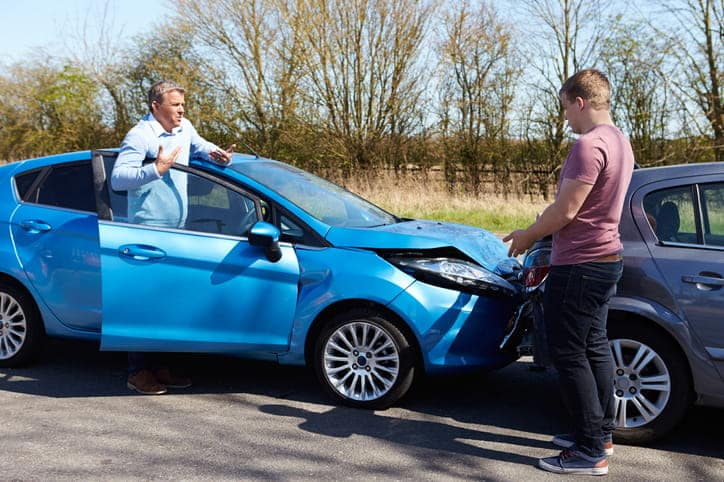What Causes Most Rear-End Collisions?

Rear-end collisions are among the most common car accidents on our roads and highways today. They range from minor fender benders to serious, high-speed impacts that cause significant damage and injuries. When you are injured in a rear-end collision, it is in your best interest to consult with a car accident attorney as soon as possible.
Get solid legal advice after a rear-end collision with a free consultation with one of our car accident attorneys in Tampa today.
What is the most common cause of collisions?
The most common cause of collisions is due to driver error or negligence, such as:
- Distracted driving
- Drowsy driving
- Texting while driving
- Speeding
- Reckless driving
- Running red lights or stop signs
- Improper lane changes
How common are rear-end collisions?
About one-third of all car accidents are caused by rear-end collisions. While most of these accidents result in minor fender benders, there are many impacts that cause injuries to the driver and occupants of the vehicle that was hit.
In 2019, there were 2,194,000 rear-end collisions in the United States, accounting for 32.5% of all vehicle crashes, as reported by the NHTSA. Out of these accidents, 595,000 people sustained injuries, and another 2,346 people experienced fatal injuries.
What is the cause of most rear-end collisions?
A variety of factors can cause rear-end collisions, and the most common causes include:
- Following too closely (tailgating): Tailgating occurs when a driver does not allow enough space between their vehicle and the one in front, leaving them unable to stop quickly if needed. This often happens when drivers get distracted or fail to pay attention to their surroundings.
- Speeding/Reckless driving: When drivers drive too fast for conditions, they may not have enough time to respond appropriately to avoid rear-ending another car if it unexpectedly stops or slows down ahead of them.
- Distracted driving: When drivers take their eyes off the road and focus on something else, such as texting, talking on the phone, eating food, or putting on makeup, they become less aware of what is happening around them and may not react quickly enough if a car suddenly brakes in front of them.
- Poor weather conditions: Rain, snow, ice, and fog can reduce driver visibility, leading to an increase in rear-end collisions due to reduced reaction time or difficulty seeing things that happen ahead on the road, like someone stopping suddenly before them.
- Vehicle malfunction and defects: If a vehicle has faulty brakes or other mechanical issues that impair its ability to stop quickly, it could result in a rear-end collision if another car stops ahead without warning.
- Driver error: This can include anything from misjudging distances, not looking ahead of traffic, or driving too aggressively.
- Texting while driving: The dangers of texting while driving are well known, and it has been shown that sending or reading a text message can take the driver’s focus away from the road for up to five seconds. This distraction is especially dangerous when traveling at highway speeds, as this could result in rear-ending someone if they suddenly stop ahead.
- Drowsy driving: Drowsy driving can impair a driver’s ability to react quickly if something happens ahead of them on the road, making it more likely that they will be involved in a rear-end collision.
- Driving under the influence: Driving under the influence of drugs or alcohol impairs a driver’s ability to make judgments and react quickly, making them more likely to rear-end someone.
Regardless of the cause, rear-end collisions can be dangerous and result in severe injury or death. Therefore, it is vital for drivers to always remain aware of their surroundings and drive safely to reduce the risk of a collision.
What can be done to reduce rear-end collisions?
Several things can be done to help prevent and reduce rear-end collisions, such as:
- Completing an online defensive driving course to brush up on driving skills
- Avoid driving when you are tired or have been drinking or taking drugs
- Putting the phone down and using hands-free and voice-activated features
- Avoid eating, putting on makeup, or other things that are distracting
- Investing in a newer vehicle with advanced safety features, like forward collision alert and assist
What are some common injuries from rear-end collisions?
Rear-end collisions can result in a wide range of injuries, depending on the speed and angle of the collision. Common injuries associated with rear-end collisions include:
- Whiplash: Whiplash occurs when the head is suddenly jerked forward and then backward due to the force of impact from a rear-end collision. Symptoms may include neck pain, headaches, dizziness, blurred vision, and difficulty concentrating.
- Traumatic brain injury (TBI): A traumatic brain injury can occur if an individual’s head hits something during a rear-end collision or if their skull experiences sudden acceleration and deceleration forces as a result of the impact. Symptoms may vary but typically include headache, confusion, loss of memory, and changes in mood or behavior.
- Spinal cord injury (SCI): The spine can be damaged during a rear-end collision which could cause compression fractures or other forms of trauma that lead to paralysis or other complications such as loss of sensation in certain areas of the body.
- Broken bones: If an individual’s body is thrown forward against their seat belt during a crash, they may suffer broken ribs or other fractures caused by impact with hard surfaces inside the vehicle, like the steering wheel or dashboard.
- Soft tissue injuries: Soft tissue injuries are common after rear-end collisions as muscles, tendons, and ligaments throughout the body are stretched beyond normal limits due to rapid acceleration and deceleration forces during impact, causing strains and sprains, which can be painful and take time to heal correctly.
No matter what type of injury is sustained, individuals involved in motor vehicle accidents need to seek medical attention immediately following any crash for proper diagnosis and treatment options to avoid further complications down the road. After treating their injuries, their next step should be to consult with a car accident lawyer.
What rear-end collision injuries can I be compensated for?
If you have been involved in a rear-end collision, you may be entitled to monetary compensation for your injuries and property damage, including:
- Medical expenses: This includes all reasonable costs related to any medical care or treatment necessary as a result of the accident, such as doctor visits, hospital stays, surgery, and rehabilitation.
- Lost wages: If your injuries prevent you from working or reduce your ability to earn an income, then you may be eligible for reimbursement of lost wages due to missed work or reduced hours at work.
- Pain and suffering: This type of compensation is intended to cover physical discomfort caused by your injuries and emotional distress resulting from the accident itself, like anxiety or depression that can manifest over time following a traumatic event like a car crash.
- Property damage: You may be entitled to recover any damage to personal property like your vehicle and personal items in the car at the time of the crash if your insurance does not cover them.
- Loss of consortium or companionship: In some cases, spouses or family members affected by the injured individual’s inability to perform household tasks or engage in activities they previously enjoyed together due to their injury could claim damages under this category, depending on state laws.
How much is my rear-end collision injury claim worth?
The amount of compensation you may be entitled to claim in a rear-end collision injury case can vary widely depending on the severity and type of injuries suffered, the amount of medical expenses incurred, and other factors such as lost wages or property damage.
It is essential to speak with an experienced car accident attorney to obtain an accurate estimate of what you may be able to recover based on your individual situation and to provide you guidance on the best course of action for seeking maximum compensation for your losses.
Get help from a car accident lawyer in Florida

When searching for a car accident lawyer near me in Florida, look no further than Jack Bernstein, Injury Attorneys. Our Tampa car accident attorneys offer a free case evaluation and consultation to discuss your injuries and the compensation you could be entitled to receive. We will provide legal representation to ensure you get the compensation you deserve.
Speak to one of our car accident injury attorneys today by scheduling your free consultation.
Sources:
Bieber, C. (2022). What Is Loss of Consortium?
Traffic Safety Facts 2019: A Compilation of Motor Vehicle Crash Data. (2019).
2022 Florida Road Safety Report: Crashes, DUIs, and More. (2022).
